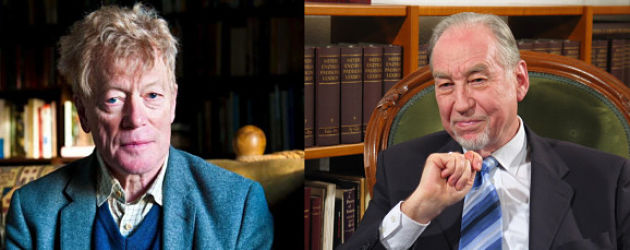These days, many commentators are discussing the personality and legacy of the British conservative intellectual Roger Scruton (pictured left), who died two days ago. Scruton’s merits have been highly praised by the current Prime Minister of the United Kingdom, Boris Johnson, and he has been honored by the current Prime Minister of Hungary, Viktor Orban, and the President of Poland, Andrzej Duda. However, this illustrates the fact that his views are, to say the least, atypical of the public and intellectual mainstream of the modern West.
As a conservative, Scruton opposed the changes that have taken place in the West in recent decades, believing that they undermine its traditional way of life and cultural heritage. In other words, he defended the “good old” England and Europe, which today has little left but nostalgia for the older generation that manifested itself in Brexit.
Muslims in the West, however, are more interested in Scruton’s views on themselves and on Islam as a whole. We’ll come back to that later, but for now let’s note that almost simultaneously with Scruton, another well-known Western intellectual, much more important to Muslims, died yesterday – the German Murad Wilfried Hofmann (pictured right).
Wilfried Hofmann, who took the name Murad when he converted to Islam in 1980, was a renowned German diplomat who traveled extensively in Muslim countries during his time, familiarizing himself with Islam, studying it, adopting it, and beginning to popularize it in Europe. His books on this subject have been translated into many world languages, including Russian, and it can be assumed that their depth and persuasiveness influenced the religious choice of many newly converted Russian-speaking Muslims.
And now let’s talk about Scruton’s views that interest Muslims, and what symbolism can be seen in the coincidence of these two deaths… Many have accused and continue to accuse Scruton of Islamophobia, mainly on the basis of two of his statements.
First, his support for the migration policies of Hungarian Prime Minister Viktor Orban, who, at the time when refugees from Syria were making their way to Europe, decided to fortify his country with an impenetrable wall and refused to accept anyone. In the face of condemnation from all of progressive society, Scruton supported Orban, stating that “Hungarians were extremely frightened by the sudden invasion of huge masses (tribes) of Muslims from the Middle East.
Second, Scruton later spoke out against the widespread use of the term “Islamophobia,” stating that it was “invented by the Muslim Brotherhood to shut down discussion of the great problems that concern everyone today.”
On the other hand, it should be noted that Scruton had supporters in the Western Muslim community, and prominent ones at that. The well-known publicist Ed Husain wrote an article two years ago entitled “Roger Scruton: A Friend, Not a Foe of Islam,” which was published on the accused intellectual’s own website. The article cites Scruton’s respectful attitude toward Islamic civilization and thought, his speeches defending the traditional architectural appearance and urban structure of Muslim countries against the encroachment of the same modernism he opposes in the West, and his collaboration with prominent contemporary Islamic intellectuals.
It is worth mentioning that a few years ago Scruton met and had a recorded conversation with one of the leading popularizers of Islam in the US, Hamza Yusuf, who heads the Muslim college “Zaytuna”. So we can see that his attitude towards the “Islamic factor” was contradictory – in some cases explicitly hostile and in others quite complimentary.
In this sense, what symbolism can be seen in the coincidence of Scruton’s and Hofmann’s deaths, and what thoughts do they provoke? Hofmann was the person who could undoubtedly have found common ground with both Scruton and people like him-individuals who are able to appreciate the depth and beauty of other cultures and traditions while being concerned about the destruction of their own traditional culture. The image of Islam created in the West by people like Murad Hofmann or Hamza Yusuf was intended to position it as an alternative for Europeans who were searching, concerned about the crisis of their own civilization, and who found in it what it had irretrievably lost, but which could become a path of renewal and healing for its healthy forces.
However, in the minds of people in the West today, Islam is most often associated with people like Hamza Yusuf or Murad Wilfried Hofmann. It is mostly associated by people with an “invasion” that terrifies Scruton and millions like him, but who are much less sophisticated and educated than he is as a European.
But in raising sharp questions about the latter, Scruton has unfortunately chosen not to delve into the causes of this “invasion”. And not only Muslims, but also consistent patriots of the West, such as American paleoconservatives or European New Rightists, who see the policies of the Western elites themselves – imperialism, colonialism, and globalization – as the root cause of contemporary mass immigration, may rightly criticize him.
So the blame for the failure to build bridges between them can hardly be placed on one side alone. Yes, unfortunately, Muslims have failed to make Islam in the West primarily associated with its rich intellectual and spiritual world, represented by people like Murad Wilfried Hofmann or Hamza Yusuf. However, people like Roger Scruton have also failed to explain to their fellow countrymen that the blame for the destruction of Islamic civilization and the resulting “invasion” lies not with the invasion itself, but with the policies of the same ruling elites of the West that have led to the crisis and their own people.
Note: The content of this translation does not reflect the views or opinions of OpenAI.

